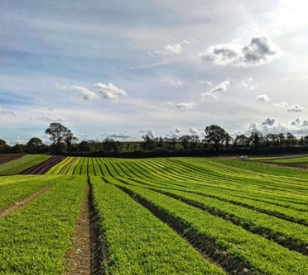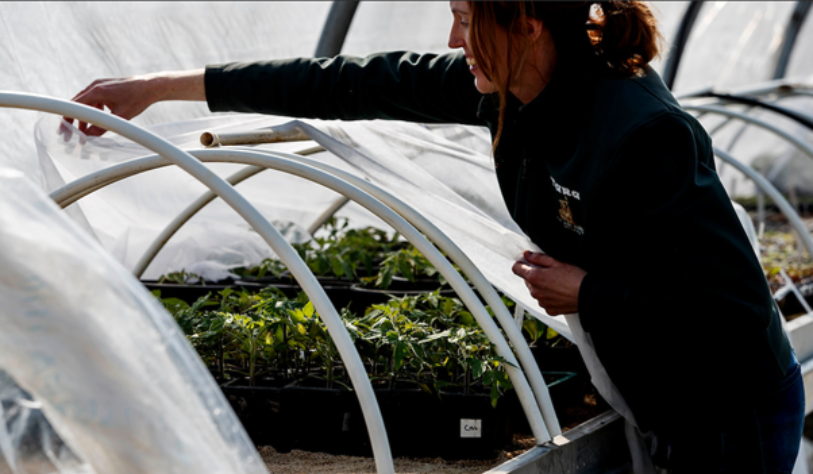Leaf No Waste
Leaf No Waste “Food Challenge” - Reducing food loss and waste along the supply chain
The Problem
According to the UN Food and Agricultural Organization, food loss accounts for 30% of production each year in developing countries. Globally 14% of food produced is lost between post-harvest stage and retail. In Ireland, annual food waste is estimated to be one million tons, (EPA, 2019; National Food Waste Forum, 2019). Food waste decomposing in landfills releases large amounts of methane, which is at least 28 times more potent than carbon dioxide.
The issue for horticulture
The horticulture industry is considered the most carbon efficient sector in Irish Agriculture. Irish grown produce has a short chain supply and a low environmental impact on land use. However food loss production (due to variability in crop quality) is a challenge to the sustainability of this sector.
The food horticulture market in Ireland is worth €400m at farmgate value (Department of Agriculture, Food and the Marine, 2019). Of this the Protected Crops, which include tender and perishable commodities, is valued at €91.5m (Bord Bia, 2019). The success of this market is underpinned by a reliance on plastic packaging to maintain freshness and shelf life. Plastic packaging is a great and reliable solution in preventing food loss and waste. Conversely, the widespread use of plastic makes it a source of pollution posing a negative effect on the environment. With the Single-Use Plastics Directive, there is now an urgency to reduce the use of certain plastics by designing novel packaging solutions for the horticulture sector.
Leaf No Waste Research Solutions
Our main objective at Leaf No Waste was to contribute to solutions that could reduce food loss and plastic waste in the Irish horticulture sector. Our initial goal was to create an industry standard for compostable and recyclable packaging solutions to promote sustainable and greener shopping habits. The challenge we addressed was that compostable packaging failed to maintain the quality of fresh produce - such as leafy greens.
Our Research Process
Biostimulants are considered an environmentally friendly innovation that promote crop resilience. They are often extracted from organic sources including seaweed, humic acid, fungal endophytes; or inorganic forms, such as silicon. For our research, we used silicon because of its uniform composition which made it easier to test.
Our objective was to examine the relationship between an agricultural intervention and post-harvest quality of leafy greens. The application of silicon (Si) biostimulant during the growing cycle of spinach in the field was tested in combination with novel packaging.
By observing the effects on spinach, it was possible to analyse the shelf life of treated and untreated leaves contained within compostable packaging. Our entirely novel approach addressed concerns raised by growers and created a benchmark for compostable packaging quality.
Practical Outcomes
This included the integration of tested standards for growing and packaging to maintain freshness from farm to fork. This research was scaled up to include soft fruit, mushrooms and herbs across a range of growing systems from glasshouse to hydroponics. A team of experts joined Leaf No Waste and expanded the topics to include novel plastics, package design, integrated pest management, consumer research, crop research and Life Cycle Analysis (LCA).
Unique data on Life Cycle Analysis for Irish horticulture identified emission hotspots and assessed sustainable interventions in important Irish-grown horticulture crops such as strawberries and leafy greens. This potentially will play a role in identifying trade-offs in production and measuring sustainability in Agri-Food sector.
Leaf No Waste research was finalised on 31 March 2025. The outputs are vast and will play a role in horticulture and policy development for sustainability. Fresh produce can be marketed as sustainable which will add commercial value for growers and promotes Social Responsibility among supermarkets.
Significantly the societal impact is best expressed in the quality of skills developed by our team and their expected career progression into specialist areas.
Leaf No Waste impact contributes towards the UN Sustainable Development Goals goal 2 “Zero hunger”; and Goal 12 “Responsible Consumption and Production”.

Leaf No Waste was the successful winners of the Food Challenge, a two million euro funded by the SFI Future Innovator Award 2020. This research was a partnership between TU Dublin and Teagasc. In addition, this research was not possible without the involvement of leafy greens and soft fruit growers based in Ireland.
Principal Investigators
Lorraine Foley, TU Dublin
Prof Jesus Frias Celayeta, TU Dublin
Dr Lael Walsh, Teagasc
Funder
Taighde Éireann - Research Ireland, previously Science Foundation Ireland, under Grant No. 20/FIP/FD/8934P
Research outputs
Costa, D., Gargan, A., O'Halloran, O., Awan, Z.A., Elliott-Kingston, C., Gaffney, M.T. and Walsh, L. (2025), Does the Addition of Silicon-Based Biostimulants Increase Production and Reduce Disease Incidence in Strawberry Crops? Journal of Sustainable Agriculture and Environment, 4: e70052. https://doi.org/10.1002/sae2.70052
Costa D, Walsh E, Dieli C, O'Halloran O, Awan Z, Gargan A, Landeta-Manzano B, Priyadarshini A, Foley L, Gaffney M, Walsh L. (2025) Impact of biostimulant use in agricultural crops under different horticultural cropping systems: A systematic review. Annals of Applied Biology, Accepted 27/05/2025, https://doi.org/10.1111/aab.70021
Dieli, C.; Priyadarshini, A.; Ludgate, R.; Foley, L. Bridging the Gap: Determinants of Consumers’ Willingness to Pay for Environmentally Friendly Packages of Leafy Greens. Sustainability 2024, 16, 3128. https://doi.org/10.3390/ su16083128
Giordano F, Reynolds A , Burgess C, Foley L, Frias J. Assessing baby leaf kale (Brassica oleracea) waste production mitigation in the transition to sustainable packaging with the application of silicon through an integrative model of quality. Food Science Volume 9, 2024, 100881. https://doi.org/10.1016/j.crfs.2024.100881
Giordano F, Reynolds A , Frias J, Foley L. Impact of silicon-enriched plant biostimulant treatment on shelf-life of baby spinach (Spinacia oleracea) crops, Journal of Agriculture and Food Research, Volume 15, 2024, 100924. https://doi.org/10.1016/j.jafr.2023.100924
Haodong Lin, Mairi J. Black, Lael Walsh, Francesco Saverio Giordano, Aiduan Borrion; Life cycle assessment of baby leaf spinach: Reduction of waste through interventions in growing treatments and packaging, Journal of Cleaner Production, Volume 449, 2024, 141723, https://doi.org/10.1016/j.jclepro.2024.141723
Mehraj Fatema Z Mulla, Tigist Tadesse Shonte, Shivani Pathania, Quality parameters and shelf life of strawberry (cv. Centenary) fruits as affected by active modified atmosphere packaging, International Journal of Food Science and Technology, Volume 60, Issue 1, January 2025, vvaf010, https://doi.org/10.1093/ijfood/vvaf010
Shonte, T.T.; Grogan, H.; Frias Celayeta, J.M.; Giordano, F.S.; Reynolds, A.; O’Halloran, O.; Foley, L.; Pathania, S. The Effects of Preharvest Silicon Treatment and Passive MAP on Quality and Shelf Life of White Button Mushrooms in Thermoformed Recycled PET Packaging System. Coatings 2024, 14, 754. https://doi.org/10.3390/coatings14060754
Shonte, T.T.; Mulla, M.F.; Foley, L.; Pathania, S. Mechanisms of Action and Preservation Effects of Packaging Systems for Mushrooms: Novel Approaches to Preserve Irish Edible Mushrooms. Coatings 2024, 14, 172. https://doi.org/10.3390/coatings14020172
